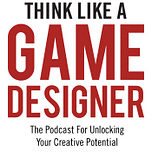About Stephan Brissaud
Stephan Brissaud joins us today to explore his extensive career in navigating the gaming industry. With his roots beginning at Nintendo, Stephan has tackled roles from COO of Iello to President of the Game Manufacturers Association and Senior Director of Games at Funko. He’s not just a veteran; he’s a strategist and consultant who has mastered the art of bringing games from concept to consumer hands, navigating marketing strategies, distribution channels, and retail complexities. In today's episode, Stephan discusses how game design intertwines with marketing and expansion, sharing insights that creatives can't afford to ignore. Tune in to discover the depth of Stephan Brissaud’s impact on the games industry and the lessons from his journey that could redefine your approach to game design and creativity.
Want to support the podcast and get more design lessons?
Paying subscribers enjoy an abundance of extra game design content and an exclusive newsletter with new lessons, archive access, videos, and more! By opting for a free or paid subscription, you can get the latest articles delivered to your inbox and support this podcast!
Ah-ha! Justin’s Takeaways
In this episode of Think Like a Game Designer, Stephan and I briefly discuss the CORE system, a set of attributes I developed to help me excel in my creative field. I believe it’s worth sharing here for the first time.
In short, with traditional Role Playing Games (RPGs), players create characters with core attributes like Strength, Intelligence, Dexterity, and Charisma, determining their success in various tasks. Applying this principle to real-life skills, we can develop our own CORE attributes: Curiosity, Obsession, Resilience, and Empathy.
Curiosity: Deep, genuine interest in the world around you.
Obsession: A relentless ability to focus on one task or subject.
Resilience: The ability to use obstacles as fuel for growth.
Empathy: Understanding and aligning the perspective of others.
These aren't just buzzwords but the foundational elements that have guided me in my career, creative projects, and personal life. They're broad enough to be universally applicable but specific enough for everyone to understand and improve upon. Remembering the CORE acronym can help you remember and implement these attributes when needed.
Show Notes
"A colleague of mine at Nintendo introduced me to Magic the Gathering." (13:05)
Stephan discusses his unexpected entry into the gaming industry through Nintendo France. He describes how his passion for building and coding led him to work on the Minitel system, a precursor to the internet, where he managed customer service for Nintendo. He also shares how his introduction to Magic: The Gathering (which he played by email) rekindled his love for fantasy games. This passion eventually led to his role at Wizards of the Coast, where he organized major events like the first Pro Tour outside the USA.
"You need to think from the moment you start designing the game to the moment you are selling it." (22:04)
Stephan emphasizes the importance of integrating community-building strategies into the game's design phase. He discusses the challenges of the oversaturated market and the necessity of a comprehensive marketing approach that includes designing for expandability and appealing to niche communities.
"It's those retailers that are essential for the survival or the continuation of publisher." (31:03)
In this segment, Stephan emphasizes the critical role of retailers in the gaming ecosystem. He explains how these stores not only influence trends but also foster communities, which are essential for the success of tabletop games. He highlights the evolving dynamics of the distribution network and the challenges of getting a game noticed in a crowded market.
"There are so many pieces to the puzzle of launching a successful game. You have to attack every piece of that puzzle because there's so much noise. It's about creating a flywheel effect where the buzz is happening, and that's when your game breaks through." (40:06)
Here, Stephan provides tips on how to create buzz and ensure a game's visibility amidst the general noise. He shares an experiment he conducted at Iello, demonstrating the importance of direct communication with retailers and innovative marketing tactics to enhance a game's presence.















Share this post